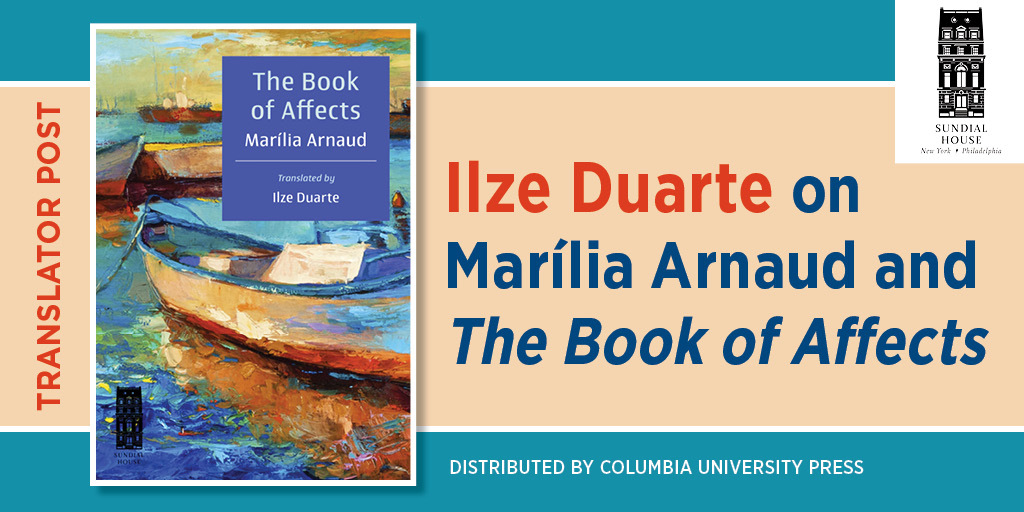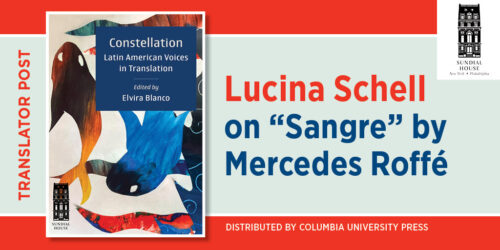Ilze Duarte on Marília Arnaud and The Book of Affects

Marilia Arnaud, author of O livro dos afetos (The Book of Affects), was born in Campina Grande, in the northeastern state of Paraíba, and lives in João Pessoa, the capital city. Arnaud first became known in Brazil as a short story writer, with her stories earning prize after prize in Paraíba. Arnaud would go on to write three novels, including O pássaro secreto (The secret bird), which brought her to national attention in 2021 as the winner of the Kindle Prize in Literature.
Arnaud belongs in the distinguished tradition of northeastern writers such as Graciliano Ramos, José Lins do Rego, Ariano Suassuna, Jorge Amado, and Rachel de Queiroz. In her preface to Arnaud’s short story collection Os campos noturnos do coração [The nocturnal fields of the heart, 1997], Queiroz, then a member of the Brazilian Academy of Letters, says of Arnaud: “Marília Arnaud never squanders a poetic moment, works diligently at it, re-creates reality with ease, as if picking a flower. It is with great pleasure that I introduce the work of this new writer. Come to think of it, this is risky of me, as I see I am ushering in a competitor. A strong one!” (my translation). Arnaud is now in the illustrious company of such contemporary northeastern authors as Maria Valéria Rezende, Itamar Vieira Junior, Socorro Acioli, and Stênio Gardel.
Why highlight the place a writer comes from—in this case, the Brazilian northeast? Brazil is a country of continental proportions, its geographical regions varying as much in topography and climate as in the local residents’ ways of living—their occupations, connections to the land, traditions, clothes, cuisine. Such plurality of physical landscapes, lived experiences, and perspectives has always been represented in Brazilian literature. For example, Rio de Janeiro figures prominently in the works of Machado de Assis and Clarice Lispector; various parts of the vast northeast, in the works of José Lins do Rego, Graciliano Ramos, Jorge Amado, and Rachel de Queiroz; the hinterlands of Minas Gerais and neighboring states, in the work of Guimarães Rosa; the city of São Paulo as well as popular traditions around Brazil, in the works of Mário de Andrade; the Rio Grande do Sul of the past and present, in the works of Érico Veríssimo. To acknowledge a Brazilian writer’s place of origin is often meant, as it is here, to celebrate the diversity of Brazilian culture and literature.
To acknowledge a Brazilian writer’s place of origin is often meant, as it is here, to celebrate the diversity of Brazilian culture and literature.
There is a danger, however, in regarding literary works from various parts of Brazil as “regional literature.” The term was first used to describe works by the nineteenth-century writer José de Alencar, which focused on the origins of Brazil as a country and featured indigenous people as protagonists. Subsequently, it became synonymous with literature depicting the particularities—what was “typical”—of the various regions of Brazil and local communities. In school, I learned about Brazilian folklore and often heard the word “typical” but rarely, if ever, in connection to my native state of São Paulo. To me, and I suspect to many other students, the terms “regional” and “typical” gave places outside of our state—or even our city—an aura of exoticism.
Many years later, I would read Luiz Ruffato’s introduction to O livro dos afetos and nod in recognition and agreement. A writer from the state of Minas Gerais, Ruffato points out that the “regional literature” label is used as a catch-all category for any work produced outside the cities of São Paulo and Rio de Janeiro, the big centers of Brazilian publishing. Indeed, from my times as a schoolgirl to today, I haven’t seen the “regional literature” label in reference to the work of Machado de Assis, who chronicled life in nineteenth- and early twentieth-century Rio de Janeiro, or to the work of Mário de Andrade, who wrote a great deal about the frantically growing São Paulo of the 1920s. Even though in recent years writers and literary critics have rejected the “regional” label, it still appears on Brazilian educational websites and in the press.
But perhaps the most precious gift Arnaud gives her readers as a Brazilian writer is her beautiful use of our language.
In The Book of Affects, the characters stroll by the seashore, sit on the porch and enjoy the sea breeze, hear the crashing of waves, feel the heat of a scorching sun, yet no locations, real or fictitious, are named. Ruffato dares Arnaud’s readers to figure out where the stories in Arnaud’s collection take place and invites them to ponder the relevance of the question. Ruffato adds, “It seems to me that what matters is the writer’s capacity to suffuse her work with what is human. . . . And humanity is plentiful in this collection” (my translation). These stories of love, desire, betrayal, loss, and longing could have taken place anywhere. The particular—rather than the “typical”—and the universal coexist here, as they do in all great works of literature.
Ultimately, Marilia Arnaud is a Brazilian writer. Her characters quote lyrics from Brazilian songs, play soccer, go to Carnaval balls, watch soap operas. But perhaps the most precious gift Arnaud gives her readers as a Brazilian writer is her beautiful use of our language. She is one of the most accomplished wordsmiths in Brazilian literature, her command of Portuguese the strongest I know. It was Arnaud’s ability to delight readers with her refined, lyrical language that first drew me to her work. Her novel Suíte de silêncios (Suite of silence), my introduction to her writing, reads like a long prose poem. It captivated me from the first words and had me enthralled to the last. And when I read The Book of Affects, I was again enraptured by Arnaud’s moving, evocative descriptions of her characters’ internal landscapes. Arnaud is a master of the expression of emotion.
It was my love of literature and the English language that led me to translate Arnaud’s work. I wanted to render the beauty of her words, of our beloved Portuguese language, and the power of her storytelling into this other language I also call mine.
Ilze Duarte is a recipient of the 2024 Sundial House Literary Translation Award. She translated The Book of Affects by Marília Arnaud.








